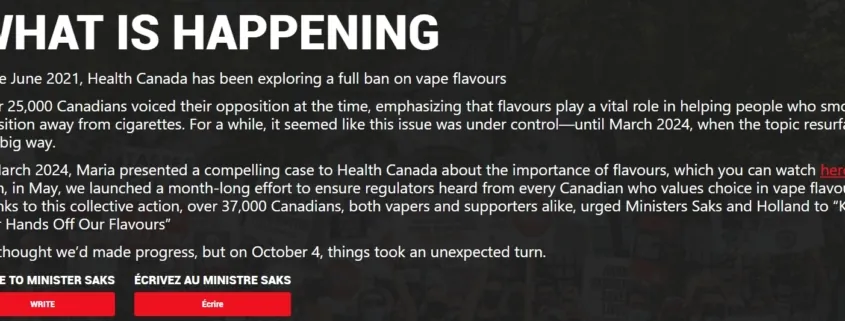Canada Antitobacco Groups Urge Swift Action on Vape Flavour Restrictions
Antitobacco Groups Urge Swift Action to Protect Public Health
Leading tobacco control organizations are calling on Addictions Minister Ya’ara Saks to swiftly remove flavoured vaping products from the market, as promised earlier this fall. The groups cite recent Canadian studies as further evidence of the harm caused by the federal government’s three-and-a-half-year delay in finalizing these critical regulations.
A newly released study of Quebec high school students from the longitudinal COMPASS survey reveals that those who vape become severely addicted to nicotine within the first year. “Flavours are the main driver of youth vaping,” said Flory Doucas, Co-Director and Spokesperson for the Quebec Coalition for Tobacco Control. “The sooner we remove the flavours that lure teenagers into e-cigarette use, the more young people we can protect from severe and long-lasting addiction.”
New Canadian research also shows that flavouring additives increase the harms caused by vaping. A McGill University team recently demonstrated that berry-flavoured vapes impair the lungs’ ability to fight off infections. “These recent studies add to the longstanding evidence that youth are at risk and that vaping products are dangerous and highly addictive,” said Cynthia Callard of Physicians for a Smoke-Free Canada. “Yet instead of accelerating flavour restrictions, Minister Saks seems to be delaying effective protection even further.”
Despite government signals that restrictions were coming “soon,” possibly even in November, the pro-vaping lobby launched new campaigns aimed at blocking the regulations. Their tactics include writing to ministers, generating thousands of robo-letters from customers, planning news conferences, and reportedly being invited by Minister Saks’ office to provide alternatives to flavour restrictions.
“While vaping companies have a right to express their interests, we call on Minister Saks to resist their lobbying tactics and prioritize the health of our youth by moving forward with vaping flavour restrictions as soon as possible,”
added Ms. Callard.
Les Hagen, Executive Director for ASH Canada, compared Canada’s delays to progress in other jurisdictions. “A growing number of countries, including China, Netherlands, Finland, and Hungary have prohibited flavoured vaping products except ‘tobacco’ flavour, and an EU-wide ban may be in development. Yet despite having one of the highest youth vaping rates, Health Canada has left provinces unable to defend their own restrictions against noncompliant vape stores.”
“Delaying flavour restrictions is another gift to the tobacco and nicotine industry, making it easier for them to recruit youth into nicotine addiction,” concluded Mr. Hagen.
As a longtime advocate for protecting public health, I’ve seen firsthand how flavoured vaping products can lure young people into nicotine addiction. The evidence is clear – we need swift action to restrict these dangerous products and safeguard the well-being of our youth. By sharing the insights of leading experts and highlighting the real-world consequences of delayed protection, I hope to compel decision-makers to prioritize this critical issue. Together, we can create a healthier future for the next generation.
- Roundup of July 2025 Enforcement Actions on Illegal Vape - July 25, 2025
- The Nicotine Pouch & Oral Nicotine Report: 2025 - July 25, 2025
- California Ranks Lowest for Youth Vaping in the U.S. - July 25, 2025








